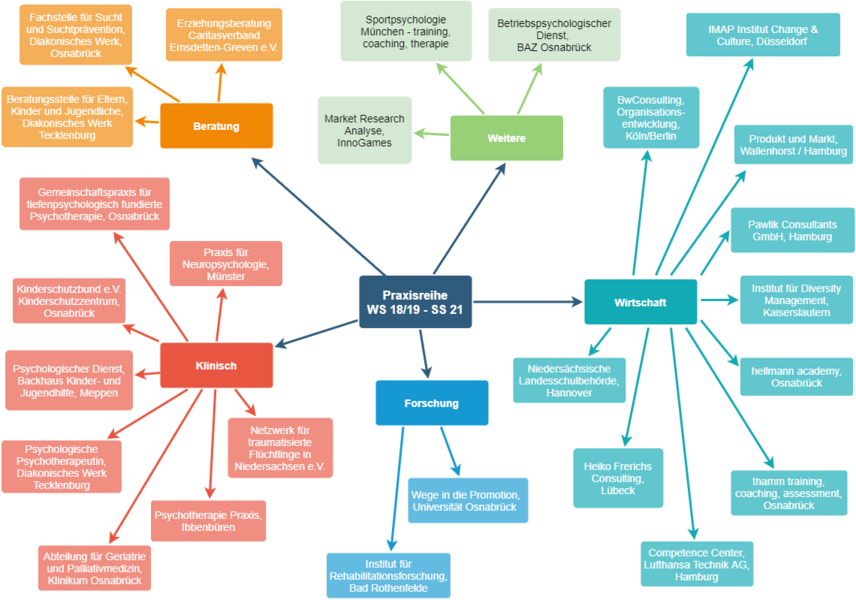Psychology, and then?!
Many students do not know exactly what they want to do after graduation when they start their studies or even during their studies. On this page, we have collected information and ideas in various formats that can help you get an overview of the wide range of professional fields. Of course, there are many more areas in which psychologists can work - the possibilities are numerous!
The practical series of the Institute of Psychology is designed to give you an insight into the variety of professions that you can pursue as a psychologist. Each semester, different psychologists report on their activities, and the jobs of the speakers in the practical series offer a small insight into what you can actually do with a psychology degree:


Job profiles in psychology - Videos
As part of the 2021/2022 practical series, students created videos on professions that you can pursue as a psychologist. The videos show possible content and tasks and explain what a possible career could look like. The following links lead to the videos (YouTube):

Job profiles in psychology
As part of the practical series, students created professional profiles of some of the speakers. These do not claim to be exhaustive, but offer an impression of the profession and can serve as an impulse for finding a career.
- Diversity management
- Forensic psychiatry
- Human resource management
- Child and adolescent psychotherapy
- Child protection agency
- Organizational Development
- Doctorate
- Psychological psychotherapist
- Psychological expert for family law
- Management consultancy
Other sources of information on different professions that you can pursue as a psychologist:
Short videos on professional profiles from the German Psychological Society
Book tips on the topic of "Psychology in studies and work" from the German Psychological Society
"Meet the Expert: First-hand knowledge" Interviews with psychologists on current, applied topics from psychology and related sciences
Career information from the Federal Employment Agency - information on various professions and fields of activity
Old and new in psychotherapy - training or further education
A lot has changed recently for students seeking a license to practice as a psychological psychotherapist or child and adolescent psychotherapist. With the introduction of the new licensing regulations, the licensing procedure is as follows:
- 3-year Bachelor's degree in psychology (with all licensing-relevant content) followed by a 2-year Master's degree in psychology with a focus on clinical psychology and psychotherapy
- Licensure after successfully completing the Master's program
- Subsequent further training
For students studying under the "old system", the path is different:
- 3 years Bachelor's followed by 2 years Master's (major or at least minor in "Clinical Psychology")
- Training
- License to practice after successful training
Further information can be found on the website of the Federal Ministry of Health or on the website of the DGPs.
Specializations and procedures
Training or further training as a psychological psychotherapist (PP), child and adolescent psychotherapist (KJP) or neuropsychological psychotherapist is possible.
Procedure:
- Behavioral therapy
- Depth psychology-based psychotherapy
- Analytical psychotherapy
- Systemic psychotherapy
Information on continuing education degrees at Osnabrück University can be found here.
Psychiatrist, psychologist, psychotherapist - what are the differences?
An overview and explanation can be found here.
Doctorate
Doctorates are also possible following a Master's degree in Psychology. At Osnabrück University, such a doctoral program usually lasts six semesters. Depending on the research topic and the dissertation, the degree of Doctor of Natural Sciences (Dr.rer.nat.) or Doctor of Humanities (Dr.phil.) can be obtained.
The Center for Doctoral Students (ZePrOS) regularly offers information events for those interested in doing a doctorate. You can also find the events here.


